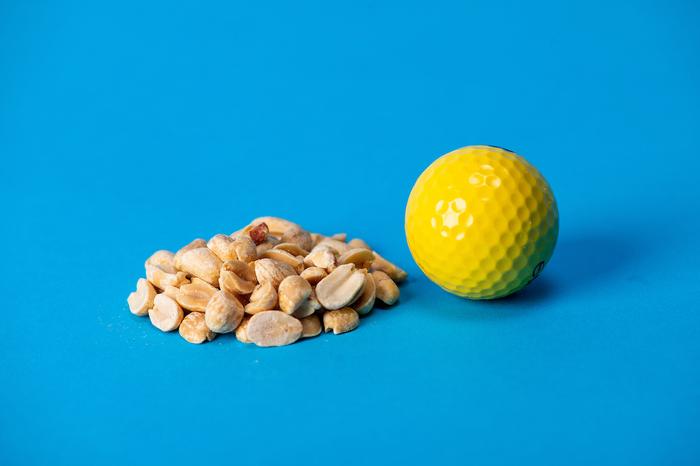Women who consume higher amounts of protein, especially protein from plant-based sources, develop fewer chronic diseases and are more likely to be healthier overall as they age, according to a study led by researchers at the Jean Mayer USDA Human Nutrition Research Center on Aging (HNRCA) at Tufts University and published Jan. 17 in The American Journal of Clinical Nutrition.

Credit: Alonso Nichols/Tufts University
Women who consume higher amounts of protein, especially protein from plant-based sources, develop fewer chronic diseases and are more likely to be healthier overall as they age, according to a study led by researchers at the Jean Mayer USDA Human Nutrition Research Center on Aging (HNRCA) at Tufts University and published Jan. 17 in The American Journal of Clinical Nutrition.
Analyzing self-reported data from more than 48,000 women, the researchers saw notably less heart disease, cancer, and diabetes, and cognitive and mental health decline, in those who included more protein in their diets from sources such as fruits, vegetables, bread, beans, legumes, and pasta, compared to those who ate less.
“Consuming protein in midlife was linked to promoting good health in older adulthood,” said Andres Ardisson Korat, a scientist at the HNRCA and lead author of the study. “We also found that the source of protein matters. Getting the majority of your protein from plant sources at midlife, plus a small amount of animal protein seems to be conducive to good health and good survival to older ages.”
Findings were derived from the seminal Harvard-based Nurses’ Health Study, which followed female health care professionals from 1984 to 2016. The women were between the ages of 38 and 59 in 1984 and deemed to be in good physical and mental health at the start of the study.
Ardisson Korat and fellow researchers, including senior author Qi Sun of the Harvard T.H. Chan School of Public Health, examined thousands of surveys collected every four years from 1984 to 2016 on how frequently people ate certain foods to pinpoint dietary protein and its effects on healthy aging. They calculated protein intake by multiplying the number of times each food item was consumed by its protein content and then, using the Harvard University Food Composition Database, totaling the amount of protein across all food items.
The researchers then compared the diets of women who didn’t develop 11 chronic diseases or lose a lot of physical function or mental health, with the diets of those who did. Women who ate more plant-based protein, which in 1984 was defined as protein obtained from bread, vegetables, fruits, pizza, cereal, baked items, mashed potatoes, nuts, beans, peanut butter, and pasta, were 46 percent more likely to be healthy into their later years. Those who consumed more animal protein such as beef, chicken, milk, fish/seafood, and cheese, however, were 6 percent less likely to stay healthy as they aged.
“Those who consumed greater amounts of animal protein tended to have more chronic disease and didn’t manage to obtain the improved physical function that we normally associate with eating protein,” said Ardisson Korat.
Animal protein was modestly tied with fewer physical limitations in older age, but plant protein had a stronger, more consistent correlation across all observed models, and was more closely linked with sound mental health later in life. For heart disease in particular, higher plant protein consumption came with lower levels of LDL cholesterol (“bad” cholesterol), blood pressure, and insulin sensitivity, while higher animal protein intake was tied to higher levels, along with increased insulin-like growth factor, which has been detected in multiple cancers.
Dairy protein alone (mainly milk, cheese, pizza, yogurt, and ice cream) was not significantly associated with better health status in older adulthood.
The team acknowledged that the benefits of plant protein might derive from components in plant-based food, rather than the protein—compared to animal foods, plants contain a higher proportion of dietary fiber, micronutrients, and beneficial compounds called polyphenols that are present in plants, rather than exclusively protein.
Ardisson Korat also said data from other groups is needed, as the Nurses’ Health Study surveyed primarily white females working in health care. “The data from the study tended to be very homogeneous in terms of demographic and socioeconomic composition, so it will be valuable to follow up with a study in cohorts that are more diverse. It’s a field that is still evolving,” said Ardisson Korat.
But the team’s findings so far support the recommendation that women eat most of their protein in the form of fruits, vegetables, nuts, and seeds, although they should also consume some fish and animal protein for their iron and vitamin B12 content.
“Dietary protein intake, especially plant protein, in midlife plays an important role in the promotion of healthy aging and in maintaining positive health status at older ages,” Ardisson Korat said.
Research reported in this article was supported by the U.S. Department of Agriculture’s Agricultural Research Service, and by the National Institutes of Health under award numbers UM1CA186107 (National Cancer Institute), P01CA87969 (National Cancer Institute), R01DK120870 (National Institute of Diabetes and Digestive and Kidney Diseases), U2CDK129670 (National Institute of Diabetes and Digestive and Kidney Diseases), R01DK127601 (National Institute of Diabetes and Digestive and Kidney Diseases), R01HL060712 (National Heart, Lung and Blood Institute), R01HL034594 (National Heart, Lung and Blood Institute), R01HL035464 (National Heart, Lung and Blood Institute), and R01HL088521 (National Heart, Lung and Blood Institute). Andres Ardisson Korat was supported by training grant KL2TR002545 from the National Institutes of Health’s National Center for Advancing Translational Sciences. Complete information on authors, funders, limitations and conflicts of interest is available in the published paper. The content is solely the responsibility of the authors and does not necessarily represent the official views of the U.S. Department of Agriculture or the National Institutes of Health.
Journal
American Journal of Clinical Nutrition
DOI
10.1016/j.ajcnut.2023.11.010
Article Publication Date
17-Jan-2024




